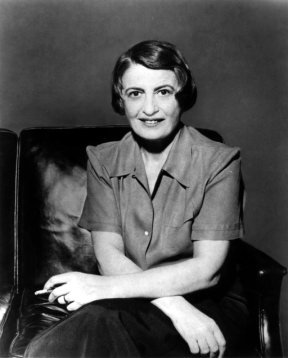(Ayn Rand was a philosopher who made brilliant breakthroughs in several fields. For example, she made several important contributions to the advancement of liberal ideas. She was the foremost advocate of rational self-interest, a frequently misunderstood idea which holds that it is morally best to pursue one’s selfish interests and that other people (whether friends, family, or members of society) do not have a claim on one’s life. A passionate individualist, Rand celebrated the heroic potential of man through her fictional heroes, such as Howard Roark in The Fountainhead or Dagny Taggart in Atlas Shrugged, that Rand most clearly demonstrates the means by which individuals can lead rationally selfish, virtuous lives of integrity.
The short summary of Rand's ideas below is provided by Elliot Temple)
Man is different from animals because he has a mind. He should use it. His mind is fallible but can create objective knowledge. Fallible knowledge is not a contradiction. You do your best with your mind and later you learn more things and improve and change your ideas, but this later improvement does not invalidate the previous ideas, it doesn't make them worthless, they could still have been valuable (or mistakes).
Knowledge is contextual. Rather than "Which flavor of ice cream is best?" one needs to consider, "Which flavor of ice cream is best for a particular situation/context/purpose?" This addresses the issue of getting new evidence and information and otherwise learning more and improving. If you improve and get new ideas then you have a new context. It doesn't change what made sense in the previous context with its more limited information.
The world is complicated. To deal with it, men must organize their thinking. We can use concepts like "table" to group ("integrate") many percepts (individual perceptions, e.g. vision of a table) together. And concepts themselves can be grouped, e.g. "furniture". One of the methods of grouping is to focus on some notable commonality while allowing differences in other aspects (e.g. two tables might be different sizes, but they are both tables). One specific way of doing this is "measurement omission": grouping stuff together in a way ignoring differences in a particular measurement like width.
To further help deal with the complexity of the world, we automate some of our thinking. We make it a habit that doesn't require conscious attention. For example we automate the process of identifying what is or is not a table. That is far from trivial (try to write a computer program to do it, or write down some instructions that don't have any loopholes or ambiguities). But we learn to do it without explicit attention.
Correct thinking cannot contain contradictions. As we build up our knowledge we must avoid contradictions, and as we learn new things we must check them against our existing ideas for contradictions. When two ideas are found to contradict, at least one must be mistaken, so further thought is required.
A moral life for a man is a life which is suitable to man. That means a life relying on his rational mind. It is moral to think and immoral to refuse to think. This has further consequences. For example people should figure out how to deal with problems instead of being passive "victims". Thinking can create control over reality and change things while passively letting stuff happen does not require thinking.
Altruism is a system where men do not live by their own minds. They don't take responsibility for themselves. It denies the nature of man as individuals each to use his mind to run his own life. Instead it asks men to sacrifice themselves, and do things contradicting their best judgment, for the sake of others. Why? If it was efficient that people help each other -- as it often is -- they could do so by voluntary trade. Altruism seeks interactions which are not for mutual benefit and relies on people not thinking about it clearly enough.
Capitalism is the economic system for individuals with minds. It leaves men free to think and to pursue their ideas, even if those ideas differ from the status quo. So improvement is possible on the initiative of individuals who wish to try (risking only their own wealth and effort, plus that of anyone else who thinks it is a good idea and wishes to invest).
Capitalism is freedom applied to economics. It lets men live according to the judgment of their own minds. All other systems do not. For example if a system violates the principle of free trade -- if it forces upon some men interactions which they do not deem to be for their benefit -- then it forces on them something contrary to the judgment of their mind.
Force always implies being forced to go against one's best thinking. Capitalism means the abolition of all force in economic matters. No other system can offer that (if it did, it'd simply be equivalent to capitalism).